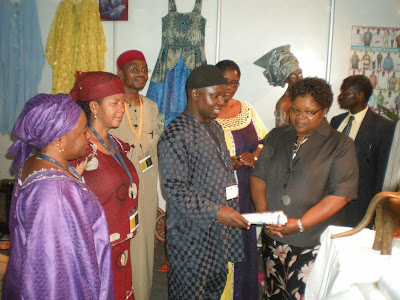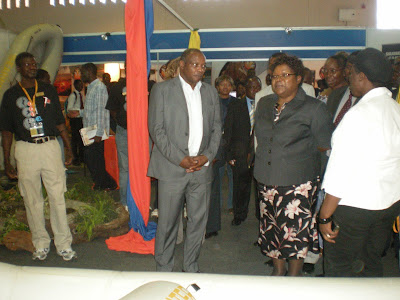 Zimbabwe Vice President Comrade Joyce Mujuru visit to international stalls at Sanganai event in Bulawayo- Zimbabwe - above is the Ethiopia Stand
Zimbabwe Vice President Comrade Joyce Mujuru visit to international stalls at Sanganai event in Bulawayo- Zimbabwe - above is the Ethiopia Stand The nigeria Stand
The nigeria Stand

The Malawi Stand

The Italy Stand

Local exhibitors






Djibouti’s President presses UN for action over Eritrea’s attack on Djibouti
The United Nations Security Council, meeting at the request of Djibouti , yesterday urged Eritrea and Djibouti to resolve their dispute peacefully, with members of the Council warning Eritrea it must comply with the Security Council’s demands of last June. These included a ceasefire, engagement in diplomatic relations and withdrawal to pre-conflict positions. According to a UN fact-finding mission to the region in July, only Djibouti had withdrawn its troops as requested. Eritrea refused entry to the fact-finding mission. President Ismail Omar Guellah told the Council that Djibouti had repeatedly tried to engage Eritrea in dialogue without success. He noted correlation should be established between the current conflict and the one between Ethiopia and Eritrea . Those conflicts shared the same element - namely Eritrea - a country that was involved in all conflicts in the Horn of Africa. He said Eritrea ’s aggression must not be ignored, remain unpunished, “or, even worse, be taken lightly by the Council.” If Eritrea still failed to comply with the Security Council demands within three weeks, then this refusal should trigger sanctions. Eritrea ’s Permanent Representative to the UN did not address Eritrea ’s refusal to pull back its troops or allow the UN fact-finding mission into Eritrea . Despite the photographic evidence to the contrary, he repeated the claim that Djibouti had been the aggressor and that Eritrea had not seized any land belonging to Djibouti . He referred to the issue as a “diversionary and fabricated conflict” but then tried to divert the discussion to Eritrea ’s problems with Ethiopia , while conceding this had nothing to do with the issue under consideration. While most speakers supported further efforts at mediation through the African Union and the Arab League, they also called on Eritrea to withdraw its troops, to co-operate with the UN and regional organizations and to comply with the Security Council’s demands of June 12. Costa Rica , for example, categorized Eritrea ’s position as “a disregard of its obligations and a lack of respect for international law and for the provisions of the Council.” France and the United States both supported the need for action against Eritrea within a clear time frame. France proposed urgent consultations on a Council text to reiterate the demand for Eritrea ’s withdrawal to its previous positions; the US called for “appropriate” action by the Council if Eritrea continued to rebuff its efforts.
In fact, Mr. Jean Ping, the Chairperson of the AU, visited Eritrea last week, but Eritrea appears to have used the occasion of the visit to continue its criticisms of the continental organization. According to an official Eritrean website, President Issayas told the Chairperson that Eritrea had not seen any meaningful accomplishment by the organization, that it had become marginalized, and that none of its original expectations had been fulfilled. The AU needed to be reformed and renewed and restructured beginning with its headquarters. Following this comprehensive denunciation, the President added that he was not saying that the AU lacked principles or even goodwill, but these needed to be translated into action. This is not the first time for Eritrea to make remarks denigrating the AU and its activities. Nor is it a surprise, as Eritrea is one of the difficulties that the AU has faced in the discharge of its mandate in support of peace and stability in Africa . Eritrea openly hosts, organizes and deploys terrorist groups, and has publicly admitted supporting armed groups operating against AU member states, in clear violation of the Constitutive Act of the Union . It has refused to cooperate in the resolution of disputes with its neighbors, most recently with the decision of the Peace and Security Council of the Union, strongly condemning Eritrea ’s military action against Djibouti and demanding its immediate and unconditional withdrawal from the Djiboutian territory it occupied. As President Ismail Omar Guellah said, it is now up to the Security Council to take decisive measures against Eritrea and failure to do so will have ominous consequences for regional peace and security.

